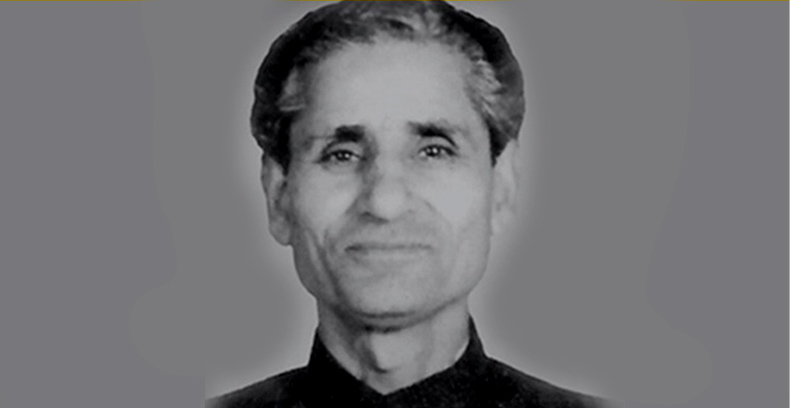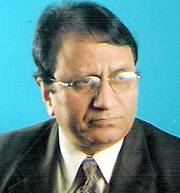An Immortal Soul

|

M K Raina Ratnakar
|
| All of us know about one vicious circle - how one evil begets another evil, and so on. The famous illustration is the story of a cat that pounced on a rat, the dog that devoured the cat, the tiger that killed the dog, the man who shot the tiger, the other man who robbed and killed the man and so on. But equally significant is the Blessed Circle-how one good deed begets another good deed and so on, ad infinitum. This is particularly true of spiritual and cultural-especially literary-influences which defy frontiers guarded by bayonets and guns, frontiers that seem to be demarcated by radicalized and gun trotting militants of Pakistan and the so called innocent youth of Kashmir who stone the men in uniform and remain always ready to kill them which also now includes the civilians as well. In the year 1990, it was Kashmiri Pandits only. Now they are not in the valley of Kashmir, so it is anyone and probably everyone who can be named or dubbed to be anyone or anything against Islam to get him killed Gautma, the Budha was born about 25 centuries ago in a princely family of North India. But, his teachings of love, humanity and compassion crossed the seven seas and reached distant places in the world where they influenced people’s thoughts and ideas. A certain intellectual – aristocrat named Leo Tolostoy born in 1828 read about him and his philosophy. He was already influenced by another oriental, Jesus Christ who had lived 18 centuries ago especially by his message of love and compassion. From the wide reading of religious spiritual books, he added the earlier message of Buddha – about love. But I have always been at a loss to understand about the term of Jihad of Islam. If Jihad is an Islamic term which refers to the religious duty of Muslims to maintain the religion, then I hope that none should have any problem because it is good to maintain one’s own religion. In Arabic, the word Jihad is a noun which means "to strive, to apply oneself, to struggle, to persevere". A person engaged in Jihad is called a mujahid, the plural of which is mujahideen. The word mujahid appears frequently in the Quran, often in the idiomatic expression "striving in the way of God (al-jihad fi sabil Allah)", to refer to the act of striving to serve the purposes of God on this earth. According to the classical Sharia law manual, Jihad means war against non-Muslims, and is etymologically derived from the word “mujahada” signifying warfare to establish the religion though some Muslims and scholars of Islam do not all agree on its definition. Many observers—both Muslim and non-Muslim—as well as the Dictionary of Islam, talk of jihad having two meanings. It is an inner spiritual struggle which is called the "greater jihad", and an outer physical struggle against the enemies of Islam, the "lesser jihad" which may take a violent or non-violent form. Jihad is often translated as "Holy War", although this term is controversial. According to orientalist Bernard Lewis,"the overwhelming majority of classical theologians, jurists, and specialists in the hadith "understood the obligation of jihad in a military sense." Javed Ahmad Ghamidi states that there is consensus among Islamic scholars that the concept of jihad will always include armed struggle against wrongdoers. Some of the finer details of Jihad are clear from the above para, but when we talk of human beings living all over the world who are soon going to face biological, nuclear and so many types of known and unknown wars, then please tell me, “ Are those Jihadis on the right track who are involved in the game of murder, assassination and manslaughter for any and every human being in the name of Jihad on one or the other pretext when something bigger may strike the humanity soon. Aren’t they wrongdoers?” I was supposed to speak about Sarwanad Koul “Premi”, but I don’t know why I sometimes recall those moments of life and times when under the influence of Islamic sponsored terrorism of Pakistan and Jihad by our own brethren of the same ancestry went on a spree of rape, murder and killing in the valley of Kashmir. Yes, Sarwanand koul Premi was the sweetest human being, I have come across. His sweetness flowed from his heart, pure as gold, free from the slightest trace of envy or rancor, full of understanding and sympathy for his fellowmen and always ready to share their joys and sorrows. It was this quality which made him the sweetest of the companions. Though having a masters degree in Hindi, his education was rooted in Urdu and Kashmiri. He knew no English so far as writing is concerned. He specialized himself as a devoted teacher and dabbled in writing. His major task was to tanslate Shrimad Bhagwad Gita in Kashmiri verse, biography of saint – poet Mirza Kak and story of Saint – Poetess Mata Roopa Bhawani. He has also translated Tagore’s famous “Gitanjali” in Kashmiri in prose. He was always liked by his friends, colleagues, co-villagers and common people of the area because he was always ready to help the weak and the sick and to console those who were depressed. He was a great advocate of secularism. Though liked by most of my colleagues at Radio Kashmir, Srinagar, but it was not a surprise to me if some of my colleagues had not ever given a thought to the indisputable and strangely true fact that Sarwanand Koul “Premi” was a spiritual man and the greatest gift with him was his very pleasing; delightful and divine smile. The power of his smile was often overlooked by some of my colleagues because they could not differentiate between the ordinary smile and the smile of this spiritual man named Sarwanand Koul “Premi”. He was a regular visitor to Radio Kashmir, Srinagar where I worked as a Programme Executive for more than a decade. Though he was booked by my colleagues for various programmes, but I would generally book him for the Radio Digest programme “Sheshrang”. “Tilak” on his forehead fraught with no dangers by him on his forehead had more potential value than his speech. His “Tilak” on his forehead spoke a universal language which was not cramped by differences of Grammar, Syntax or Vocabulary, a language understood by everyone despite differences of caste, creed, colour and nationality. Never misjudged, always reciprocated and possessing a friendly warmth of its own that radiated all around, his was a gesture prompted by the heart and not dictated by the mind. But, this was sore in the eyes of Pakistan sponsored terrorism and terrorists and the militants of the valley of Kashmir. The same place in between the eyebrows, where Premi used to apply the sandal wood mark as "Tilak" was pierced by an eight inch iron nail and his skin was peeled off. The entire body bore the marks of cigarette burns. The limbs were found broken and eyes of both father and the son who had also been taken away by militants were gouged out. Later they were hanged and thereafter shot dead. This was done to a man in whose house a rare manuscript of the holy Quran along with Gita was found placed with reverence in his prayer room. What Islam, militants or the radicalized youth have to say about the killing of Premi and his son who revered Quran in the same way he had reverence for Gita. Was it then that the Quran and Gita had nothing to do with the killing of Premi and his son? Was it then that the Islam had to do nothing with the killing of Premi and his son? Was it that some agency was at work which is still at work to exploit the youth of Kashmir to radicalization and change them into militants which probably the young boys of Kashmir still don’t understand? What is it ultimately is still a riddle? What does Pakistan want and in which search are the young men of Kashmir involved when they have every opportunity in India and they are utilizing those opportunities to their full advantage. The emotional prisoners of militancy and radicalization always appear happy though they are always encompassed behind the dark clouds of brain washing techniques applied on them by the clergies of Islam. All these emotional prisoners are liked by their co-prisoners because they are always alike and always ready to kill even the weak, sick and depressed. They always get joyous contentment in inhuman behavior. When they are asked about why do they undertake killings? They say,” These are the orders of our God and we are supposed to follow His orders”. The secret of His happiness and our happiness is in killing those who don’t believe in Islam. |
| |
 M K RAINA RATNAKAR
M K RAINA RATNAKAR |
| |